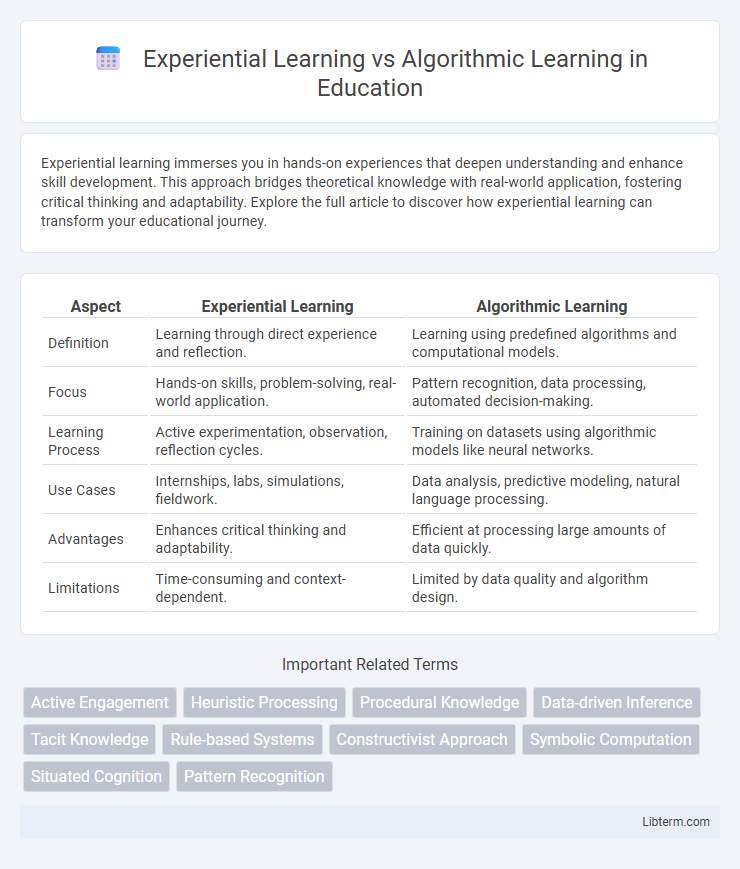Experiential learning immerses you in hands-on experiences that deepen understanding and enhance skill development. This approach bridges theoretical knowledge with real-world application, fostering critical thinking and adaptability. Explore the full article to discover how experiential learning can transform your educational journey.
Table of Comparison
| Aspect | Experiential Learning | Algorithmic Learning |
|---|---|---|
| Definition | Learning through direct experience and reflection. | Learning using predefined algorithms and computational models. |
| Focus | Hands-on skills, problem-solving, real-world application. | Pattern recognition, data processing, automated decision-making. |
| Learning Process | Active experimentation, observation, reflection cycles. | Training on datasets using algorithmic models like neural networks. |
| Use Cases | Internships, labs, simulations, fieldwork. | Data analysis, predictive modeling, natural language processing. |
| Advantages | Enhances critical thinking and adaptability. | Efficient at processing large amounts of data quickly. |
| Limitations | Time-consuming and context-dependent. | Limited by data quality and algorithm design. |
Introduction to Experiential and Algorithmic Learning
Experiential learning emphasizes acquiring knowledge through direct experience and reflection, fostering deeper understanding and practical skills development. Algorithmic learning involves using predefined rules, patterns, and step-by-step procedures to process information and solve problems efficiently. These two approaches contrast in that experiential learning prioritizes human interaction and adaptability, while algorithmic learning relies on systematic, data-driven methodologies.
Defining Experiential Learning
Experiential learning is a process through which individuals acquire knowledge and skills by directly engaging in hands-on experiences and reflecting on those activities. This approach contrasts with algorithmic learning, which relies on structured, rule-based methods and predefined sequences to solve problems. Rooted in theories by David Kolb and others, experiential learning emphasizes adapting to real-world situations through active experimentation and critical reflection.
Defining Algorithmic Learning
Algorithmic learning is a method of acquiring knowledge through structured, rule-based processes that rely on predefined algorithms and systematic procedures to solve problems. It emphasizes computational models and mathematical frameworks to improve decision-making and pattern recognition by processing large datasets efficiently. This approach contrasts with experiential learning by prioritizing explicit programming and logic-driven insights rather than hands-on, context-based experience.
Key Differences Between Experiential and Algorithmic Approaches
Experiential learning emphasizes hands-on experience and reflection to develop skills and understanding through real-world application, fostering adaptability and critical thinking. Algorithmic learning relies on predefined rules and systematic problem-solving procedures, optimizing efficiency and accuracy in structured environments. The key difference lies in experiential learning's focus on personal growth and contextual insight versus algorithmic learning's dependence on explicit, formulaic instructions for predictable outcomes.
Core Principles of Experiential Learning
Experiential learning centers on acquiring knowledge through direct experience, reflection, and active engagement, emphasizing concrete involvement rather than passive observation. Its core principles include learning by doing, continuous feedback loops, and contextual understanding that promotes deeper retention and practical skill development. This contrasts with algorithmic learning, which relies on systematic, rule-based processes and pattern recognition for knowledge acquisition without the necessity of real-world interaction.
Core Principles of Algorithmic Learning
Algorithmic learning centers on the systematic development of models through well-defined procedures like supervised, unsupervised, and reinforcement learning, emphasizing data-driven optimization and pattern recognition. Core principles include iterative refinement, convergence guarantees, and scalability, ensuring algorithms improve performance by minimizing error metrics over extensive datasets. This structured approach contrasts with experiential learning by prioritizing mathematical frameworks, computational efficiency, and provable outcomes in artificial intelligence and machine learning contexts.
Real-World Applications of Experiential Learning
Experiential learning enhances problem-solving and critical thinking through hands-on experiences, making it highly effective in fields like healthcare, engineering, and business management. Real-world applications of experiential learning include clinical simulations for medical students, internships in engineering firms, and live project management in corporate training programs. These practical experiences bridge theoretical knowledge with actual performance, accelerating skill acquisition and adaptability in dynamic environments.
Real-World Applications of Algorithmic Learning
Algorithmic learning excels in real-world applications such as fraud detection, recommendation systems, and autonomous vehicles by processing vast datasets to identify patterns and optimize decisions. This approach leverages machine learning algorithms and artificial intelligence to predict outcomes and automate complex tasks with high accuracy. Industries like finance, healthcare, and e-commerce increasingly rely on algorithmic learning to enhance efficiency, personalize user experiences, and improve predictive analytics.
Advantages and Limitations: Experiential vs Algorithmic Learning
Experiential learning offers deep, hands-on understanding by engaging learners in real-world scenarios, which fosters critical thinking and adaptability but can be time-consuming and resource-intensive. Algorithmic learning automates data processing and pattern recognition for rapid, scalable knowledge acquisition, enhancing efficiency but often lacks context awareness and flexibility. Balancing experiential learning's immersive benefits with algorithmic learning's speed and consistency can optimize educational outcomes in dynamic environments.
Future Trends in Learning Approaches
Future trends in learning approaches emphasize the integration of experiential learning with algorithmic learning to create adaptive, personalized educational experiences. Advances in artificial intelligence and machine learning enable real-time data analysis, facilitating dynamic skill acquisition through immersive simulations and real-world problem-solving. These hybrid models enhance cognitive flexibility and better prepare learners for complex, evolving challenges in various industries.
Experiential Learning Infographic

 libterm.com
libterm.com